About ICT Academy
ICT Academy is an initiative of the Government of India in collaboration with the state Governments and Industries. ICT Academy is a not-for-profit society, the first of its kind pioneer venture under the Public-Private-Partnership (PPP) model that endeavors to train the higher education teachers and students thereby developing the next generation teachers and industry-ready students. With training of teachers and students as the primary objective, ICT Academy has been working through a seven-pillar program in the areas of Faculty Development, Student Skill Development, Entrepreneurship Development, Youth Empowerment, Industry Institute Interaction, Digital Empowerment and Research & Publications. ICT Academy is recently endorsed and recommended by NITI Aayog (National Institution for Transforming India Aayog), the National Planning body of Government of India as one of the unique organization for dissemination and replication, which is aligned to the Skill India Vision of the Government of India.
ICT Academy Convergence 2019
ICT Academy CSR Convergence 2019 on the theme “Strengthening New India with the Power of Giving Back”, hosted by the ICT Academy, was a national conference for senior corporate leaders, CSR heads, non-profit organization leaders and policymakers. Organizations came together to discuss opportunities, challenges, methods, and models in achieving social and environmental progress through implementing high impact CSR initiatives.
India endeavors to develop economically at a faster pace year on year. Various new initiatives of the Government are improving the investment opportunities that accelerate growth in all the industrial sectors. Companies in India, not only work towards their business goals, they are also making CSR as integral part of their organizations.
Indian companies have been implementing innovative methods of delivering CSR projects thereby providing an opportunity for the underprivileged communities through sustainable and transformative ways. Every organization aims at maximizing its impact through creating large-scale change and sustainable models in CSR.
This exclusive conference was a platform to learn the means of developing high impact CSR programs that focus on people, thereby creating a stronger India. This event happened to be an opportunity to learn from leaders on their journey in developing new approaches, listen to their stories of change and impact, and gain insights on how leading organizations developed and implemented successful, measurable and tangible programs.
Opening Address

M Sivakumar
Chief Executive Officer,
ICT Academy
It’s a proud moment for the members of ICT Academy, as we are into our new initiative – CSR. We have ventured into CSR in concurrence with the Government of India’s CSR mandate according to the Section 135 of Companies Act 2013. This event is one of the milestones in our history. In the last 10 years, several companies have been associated with ICT Academy and benefitted several students and faculty members through free resources, software, tools, and training. So far, we have empowered 38,791 faculty members in institutions across India, trained 188,380 students through various skill development programs, empowered 264,214 youth through seminars and events, certified 1,693,122 citizens through digital literacy program, empowered 134,596 youth through entrepreneurship program, published 1,125 research papers in ICTACT Journals and we have conducted 83 events across India. These were some of the key achievements in our 10-year journey. Recently, Reliance has partnered with ICT Academy for the implementation of their CSR programs such as Financial Literacy and Digital Literacy
Presidential Address
Firstly, I would like to lay down a brief round-up of the journey of ICT Academy so far. ICT Academy was started 10 years before, with the mission to train teachers and students on next-generation technologies and make students industryready. ICT Academy follows the subscription model where colleges pay subscription amount to ICT Academy to avail the services like faculty development and student skill development. ICT Academy collaborates with partners like Salesforce, Autodesk, Oracle, Microsoft, etc., to get the course content that is relevant to the current industry trends. More than 500 colleges have become the members of ICT Academy, in Tamil Nadu in the past 10 years. Further, in the past 2 years, we have expanded our operations to 6 other regions across India where we have collaborated with around 150 colleges as members. We have also imparted the students across these member institutions with entrepreneurial skills, with the help of TiE Chennai. We have also established 50 incubation cells across our member institutions to develop the entrepreneurial skills of students.
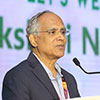
Lakshmi Narayanan,
Emeritus Vice Chairman, Cognizant & Chairman,
ICT Academy
Secondly, I would like to remind that CSR is not new for Indian companies. Many companies have been doing their CSR activities long before the government mandate came into effect. Now, with this government mandate, the companies are expected to spend at least 2% of their profits for the CSR activities. Dr. Kasturi Rangan of Harvard Business School gives a three-theatre model for CSR spending. Theater one is, focusing on philanthropy, theater two is, improving operational effectiveness and theater three is, transforming the business model. Companies should not only focus to solve short-term societal problems through CSR but also should focus on the long-term ones. One of the companies I know spends 50% of its CSR funds towards societal development activities and another 50% of its funds for developing the skillsets of the students for the future jobs. So, there are multiple models available for CSR, but I would say that companies should prefer to see the CSR as a model for long-term development.
Chief Guest Address
In the western context, Howard Bowen, known by some as the “Father of CSR”, in 1953, conceptualized the notion as a social obligation to follow those lines of action which are desirable in terms of the objectives and values of our society. In India even before the freedom i.e., in the 1930s, Mahatma Gandhi spoke about social responsibility, in which he denoted “Businessmen as Trustees”. He said, “Suppose I have earned a fair amount of wealth either by way of legacy or by means of trade and industry. I must know that all that belongs to me is the right to an honorable livelihood no better than what enjoyed by millions of others, the rest of my wealth belongs to the community and be used for the welfare of the community.”
Read More

Dr T V Somanathan IAS,
Additional Chief Secretary
- Planning, Development and Special Initiatives,
Government of Tamil Nadu
Today, CSR is nothing but trusteeship in action. CSR is not a foreign concept; it is much more Indian. In the Government’s perspective, when making CSR as a mandate in the parliament, it is one such a kind of Bill where every member of the parliament has agreed to pass the bill and make the CSR mandatory for the corporates direction with more convergence to India and the West. Senator Elizabeth Warren, the presidential candidate in the forthcoming American election has said that big companies must accept a specific written charter of social responsibility and if they fail to adhere to the charter, they must stop the business. That is more draconian than any other Act passed on CSR in India. As purely practical, if CSR is to remain relatively free and unregulated, the company will have to get their Act together.
So, as a civil service person, my opinion is that if a company obeys the law strictly and doesn’t do any harm, I would give that company a pass mark in CSR. For the companies that would like to go further, I would suggest that they have to work on a competitive advantage over government projects.
Because, the government has the ability to execute its projects in a large scale, but what it lacks is the ability to customize it. Government has a competitive advantage over the quantity but it has a lesser advantage over the quality because of its bureaucratic structure. So in my view, companies can maximize the impact of their CSR expenditure if they complement government initiatives by providing quality aspects to the projects in the fields where the government struggles to deliver. Therefore, companies can choose a small geographical spread in their vicinity and provide impactful developmental initiatives and show a good demonstration effect. What we need is a balance between the prosperity of the company as well as its social responsibility.
Key Note Session -“The Power of Giving Back” Aligning CSR with Global Challenges
CSR is the buzzword today, but for Ramco, it’s not new, it’s our culture. In the 1930s, in a small town in South India, a visionary was heading the Town Panchayat and was also the President of its Chamber of Commerce. He became an entrepreneur by starting ‘Rajapalayam Mills Ltd’. His name is P. A. C. Ramasamy Raja and he was the Founder of Ramco Group. The social welfare was part of his DNA. The town was one of India’s first to have piped water supply to its households and metal-topped roads. He said, “We believe that when the organization grows, the society and community around that should grow.” He became the first to create a blueprint for sustainable CSR. He created a Trust to serve the society, which ran on a self-financing model. Even in those years, we had formulated a strategy of spending 3% of our profit for CSR. So far, our group of companies has created 7 Trusts for the execution of CSR.
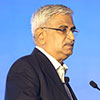
A V Dharmakrishnan,
Chief Executive Officer,
The Ramco Cements
Ramco Cements has spent around 168 crores for CSR activities in the financial year ended in 2019. We have established polytechnic colleges, engineering colleges, ITIs, and water purification plants in towns and villages. We also concentrate on promoting sports in rural areas and have sponsored rural players for championship. We have also supported the government during the cyclones & floods in regions such as Chennai, Tanjore, and Kerala contributed to the government funds, laid roads, and desalinated water bodies. At Ramco, we always believe that being socially responsible is our duty.

Chandrasekar Krishnamurthy,
Vice President - Global Services,
Dell EMC
At Dell, we ensure that our employees spend a considerable amount of their time and skill towards the welfare of thesociety and the community that they live in. Our CSR solutions are customized for the communities; they are inclusive in nature and promote equality. We want to ensure the impact is high, and each employee contributes to the cause. In the area of skill development, we have initiated the Dell Youth Learning Program through which we have trained 6 lakh students from 900 schools. Our journey of engaging with schools started way back in 2010. Our employees, especially women went to the government schools and interacted with the girl students and educated them on health and hygiene. Most of the girl students drop-out their schools because of non-availability of toilets, so as the first thing, we built the toilet for a school near our headquarters in Bengaluru.
Dell Youth Learning Program
This program aims to provide best-in-class education using digital technology to impact underserved children. Dell has completed 10 years of partnering with local organizations on the journey of enabling technology-powered education for Indian youth
Sikshana Foundation’s “Prerana”
This is our signature program, which is implemented in all 43,897 primary schools across Karnataka, impacting 2,296,139 students. We have received a Golden Peacock Award for CSR in 2015, 2017 and 2018 and CSR Impact Awards for Education in 2017.
School Adoptions
Dell has adopted 86 ATL schools & established 3 community maker spaces in partnership with NITI Aayog’s Atal Tinkering Labs initiative.
Digital Lifecare Platform
We have launched the Digital Lifecare platform as a mobile, cloud, analytics solution for the government healthcare system. We have partnered with the Ministry of Health and Family Welfare to reach the government healthcare centres and hospitals, which was implemented through collaborating with Tata Trust. In this process, over 70 Dell volunteers helped building the platform. Today, we have implemented the program in 29 states and have trained 40,000 healthcare workers to track the treatment given to pregnant women and child on their health. We aim to impact 37 million people over the age of thirty through this platform.
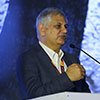
Romi Malhotra
Managing Director
DXC Technology
The examples of CSR programs that I saw here were extraordinary. Dell EMC and Ramco Cements have done a great job. Our focus on CSR is all about how we create, structure the initiatives, and partner with the government’s existing scheme, to deliver and make an impact. Domain specifically, DXC focuses on Education, People & Wellness and Environment & Disaster Relief. We work with around 30 NGOs for the CSR programs, but the scale of these programs is an issue.
For the People & Wellness program, we have partnered with an organization, where they take care of the abandoned children, which stood at 68 million across India, and who are susceptible to nefarious activities. Right from their childhood, we care them till the age of 30 and ensure that they get right healthcare, education, environment and while at their age of 28 they were able to earn at least INR 30,000 per month and afford a 2 bedroom apartment to live. It is like transforming their life from the streets to a well-settled life.
With regard to education program, we went to the slums and ensured that the maximum number of children is enrolled for the primary schools and we did our best to make them stay in the school without being dropped out. To make them stay in school, we ensured that they get the right food and they are counseled to get along with their friends. For the later, we have tied up with an NGO where they interacted with the children and provided counseling and made learning an interesting element for them. Slowly, we have started seeing the results. Finally, we deployed mobile health vans and supporting flood affected areas in Karnataka throughout the monsoon to rehabilitate people’s livelihood. DXC’s CSR initiatives are holistic that focuses on the local economy, the innovation that transformation of the ecosystem.

Ranjini Manian,
Founder Chair,
Global Adjustments Foundation
Global Adjustments Foundation aims to help women, enable women, self-power women and make them stay longer in the workforce. As a woman, my journey started up when I was speaking up for India when the FDI in India has been opened up. I spoke with the CXOs of the foreign companies and presented positive aspects of India for setting up the business while downplaying its negatives
When BMW first came to India initially with World Wide Board, they looked around 16 states in India to set up their manufacturing plant. Peter, the first-president of BMW India and his team came up for a lookup. The Board of BMW gave us just 60 minutes to present about India to understand its history, culture, and business. Even though it’s quite difficult to express the whole of India in just 60 minutes, I managed to focus only on India’s positives. After several meetings and clarifications, they got convinced to open their factory in Chennai. Now the BMW’s Chennai plant has evolved as a profit-making business unit. My experience with this meeting has helped me to conceive a curriculum that powered Champion Women Program, a program to empower women.
While Amazon’s Founder Jeff Bezos visited India to expand his business, he just wanted to know the retail behavior of India. It was difficult to explain the mindset of Indians, sitting inside a room. I gained the courage to invite him to Nalli Showroom – A retail clothing shop, where I showed the buying behavior of Indians through a live example of an Indian family purchasing a dress for their bride, for her wedding. The way I convinced Jeff to understand India’s retail behavior, I learned that women are good at building a relationship, so I thought why don’t every woman leverage it to progress in their career. This was how we built the curriculum for our Women Champion Program.
On the other occasion, while I was at Harvard Business School in Women Leadership Board, I learned that women tend to use more words than men while communicating. The women’s brain and men’s brain are wired differently and women have their uniqueness. But in real-life situations, Indian women can’t act similar to western women. Indian women are culturally bound by their family. So Indian women need to imbibe cultural mindset and at the same time adapt to the western way of working to succeed in their career
The above-said points such as, by speaking up, building and leveraging relationship, and blending Indian culture with the western way of working would empower the women for a successful career. These points have become part of the Champion Women Curriculum. Some of the women at our Foundation have voluntarily given up their high-profile career and they are on the path to empower the fellow girls and women. Data shows that an equal percentage of men and women are enrolled in tertiary education, but when coming to the workforce, women are far less employed. Our goal is to narrow the gender gap in the workforce through Champion Women Program so that they can balance their work and life better

Sujay Puthran
Head - Human Resources
Atos Syntel
Companies should align their CSR strategy to the UN’s Self Sustainable Goals. Also, they should focus on five key points while executing CSR Programs. Firstly, companies should build a CSR Strategy that leverages the company’s core competencies. Secondly, companies should identify and solve the key needs in the community where they operate. Thirdly, align the CSR strategy with the issues that matter to the company’s stakeholders. Then there should be cross-collaboration with relevant partners as any company could not implement the projects on a large scale in an efficient way. Finally, executing CSR programs with an attitude of inclusiveness is essential.
In Atos Syntel, we have our CSR program S’Prayas. Founded in 2006, S’Prayas is Atos Syntel’s Corporate Social Responsibility vehicle. With the mission of “Enriching Young Minds”, S’Prayas has created new opportunities for many bright, underprivileged children in the communities. As a technology company, we believe in holistic enrichment and imparting knowledge through the power of computer learning. In our 12+ years of journey, we have set up computer labs at NGO centres across India, and our volunteers have been workingtirelessly to help children in these communities develop life skills and become responsible and productive members of society. As an example, we established a mobile classroom called e-school with computers and a classroom, where the buses get to the communities to train the children on basic skills. The bus visits a specific community 5 days in a week to provide schooling and it currently operates in Mumbai. Now we are planning to expand the concept of e-school to other cities as well.
Our other programs include Marrow Donor Registry of India (MDRI), to help identify and match potential stem cell donors for patients with life-threatening blood diseases such as leukemia. Our program called “Gift a Life” brought together more than 4,000 employee-donors joined nearly 30,000 other volunteers to undergo a basic blood test to determine their HLA type. Also, we provide additional support by hosting and managing the MDRI stem cell donor database, making this important resource available and searchable by patients requiring a transplant anywhere across the globe
In my opinion companies should determine the impact factor that they aspire to achieve with their target, establish a method of measurement, develop an insight for emerging needs along the way, spread the passion towards social good and finally spread their stories to inspire others.
Key Note Session - CSR - Ne w Perspectives, Challenges, Opportunities & Success stories

Rajashree Natarajan,
Chief Executive Officer,
Cognizant Foundation
At Cognizant Foundation, our principle is to strengthen and scale-up work by reaching out to the most deserving communities in remote parts of the country, focusing on education, health, and livelihood, and promoting excellence and nurturing technology-led innovation to maximize impact.
In healthcare, we have sharpened our focus in preventing avoidable blindness by setting up Vision Centres, Retinopathy of Prematurity (ROP) diagnosis & treatment, School Screening Program, and capacity building in secondary and tertiary healthcare centres. Through these initiatives, over 1.6 million lives have been touched in the last 7 years.
In education, through the scholarship program, Cognizant Foundation supports meritorious students belonging to economically weaker sections of the society to pursue their higher education. We also provide scholarship to visually impaired students who wish to pursue higher education.
For the betterment of the livelihood, Cognizant Foundation partnered with several non-profit organizations, offering short-term skills training programs with guaranteed employment for the underprivileged youth, women and differently-abled. Over 19,000 lives have been transformed through CF’s livelihood programs.
Our approach towards our CSR programs is, to set an agenda, defining the goal and impact, then developing a deeper relationship with promising NGOs and promoting excellence and technology innovation
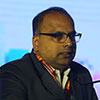
Sundararajan Sampath,
Executive Vice President and Chief Financial Officer,
CSS Corp
CSS Corp’s CSR is focused on respect and responsibility towards people, community and natural environment. CSS Corp is committed to assigning leadership and resources to CSR activities within its community and areas of influence. Initially, we are focusing on education by engaging & supporting education for underprivileged children by providing skill training that enables employability.
In the education sector, CSS Corp has signed a Memorandum of Understanding (MoU) with ICT Academy, to help build the socio-economic conditions of underserved students through quality education and training in IT. The training program is being conducted in 20 colleges spread across Tamil Nadu. The program targets to provide 100 hours of intensive activity-based training in soft skills and technical support skills for 1,000 final year graduating students from engineering, arts & science colleges located in the rural and urban areas of Tamil Nadu.
As a famous quote says, “Start Small, Start Today”, our program is like a minute drop in the ocean, but we are creating a ripple effect that is changing lives one at a time.

Manav Sehgal,
Head of Solutions Architecture - Public Sector,
Amazon Internet Services
I am from the Worldwide Public Sector, which is one of the verticals of AWS that operates with the mission. Worldwide Public Sector envisions making a positive impact in the life of every citizen of India through an AWS engagement by 2021. AWS rolls out its mission through scalable engagements that focus to improve the lives of the next half billion people in India lying at the bottom of the pyramid.
I would like to express my thoughts on how technology can help to transform business models and how it will increase operational efficiency for socially responsible businesses. Firstly, I would like to make a mention about the robotic technology that we use in Amazon warehouse to store and retrieve goods physically, without human intervention. In robotic technology, we have computer vision camera and autonomous mobility vehicles, which are the next-generation technologies. Whereas, live streaming applications like Hotstar use AWS technology to broadcast cricket matches, which supports 25 million mobile devices simultaneously. Also, AWS has built planetary-scale applications in the cloud with open geospatial data. Through this, AWS provides thousands of petabytes of data to scientists and governments for free. In similar ways, AWS powers the global businesses that are socially responsible.
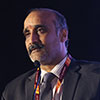
M P Vijay Kumar,
Chief Financial Officer,
Sify Technologies and Council Member,
ICAI
Businesses must be socially connected with the society. According to the data, during the year 2017-18, the average CSR spends of 1080 NSE companies is INR 10,030 crores, whereas, the unspent amount is Rs. 856 crores. The Government of India has said that violations in CSR by companies should be regarded as civil offences that are liable to monetary penalties. Another important development by the Government of India is that they have decided to implement something similar to UN’s Sustainable Development Goals, for all enterprises irrespective of the size of the organizations, what is called Business Responsibility Reporting, which has nine principles for responsible business conduct. Adhering to these principles will naturally make businesses socially responsible
Power Panel Discussion on “Being Socially Responsible”

We have Viswanathan, Pattabhi Ram, Dr Nalla G. Palaniswami, Arun Jain, M.V. Muthuramalingam, T.N. Manoharan. Like Somanathan said if people obey all the laws of the country, certainly they could be counted for being socially responsible
To be considered socially responsible, every human being should try to justify its existence in this world. We justify it by giving meaning to our life. But life by itself has no meaning. Life is an opportunity for us to give it a meaning. First 20 odd years we learn, next 30 odd we earn, but life becomes meaningful when we share what we have learned and earned with those who are in need. That adds fulfilment to our life. What is missing in today’s world is being humane. In my opinion, living life with humanity towards others is all about being socially responsible.
Social responsibility is not something that will be taught in schools and colleges. It has to be a basic quality for everyone. And it’s not necessary that only corporates or big institutions should be socially responsible. Everyone has to be socially responsible, the responsibilities may vary from person to person but at the end of the day, everyone needs to be aware of their social responsibility towards the society.
Social responsibility has got a complex dimension to it. There are five dimensions to look at it. The first dimension is my professional workspace. The second dimension is my family and the extended family. The third dimension is around the community that I am living in. Fourth is the society that we live in. And finally, the fifth dimension is our environment. An individual can choose any of these dimensions and all of us will have to be socially responsible for any one of these dimensions.
People in the US are more socially responsible than us. Our country lacks cleanliness and hygiene when compared to other countries around the globe. Even now people in rural areas are not aware on how to use toilets. As socially responsible citizens, it is our duty to teach people about the basic hygiene practices, which in turn will benefit the society and the environment. To sum up, social responsibility is something that everyone is supposed to have and it is our duty to teach the same to our future generations as well.
Valedictory Session

Dr Santhosh Babu IAS,
Principal Secretary - Information Technology,
Government of Tamil Nadu
I am extremely privileged to be here among the audience discussing and debating why CSR is important for our society. I am happy that ICT Academy has organized this event because this is one such area which all of us are aware of, but not contributing sufficiently towards. I have a philosophy; there are only two parts of life. The first part is we being a taker, in which we keep taking money, love, affection and a lot more till we are economically independent. Once we are economically independent, our thoughts should be about giving.
For example, the people who built our home or any building will not be allowed to access the building once the work is completed. Same goes for the farmers as well, they feed us 3 or 4 times a day but they are in poverty. In general, these are the people who build our country brick by brick; doing something back for them is what social responsibility is.
Secondly, when we talk about giving back, it’s not always money; it can be our time and effort as well. Is it possible to live life without expectations? This is something I am intrigued about. Doing something absolutely without any expectations is social responsibility. Further, it is our responsibility to have a track of where our efforts or money are being utilized. Few areas which I would flag would be education, health, and literacy. Government’s fund is scarce; therefore, certainly few areas would be left undeveloped and that is the gap CSR could fill.
Thirdly, let me talk about a few initiatives in the IT industry. The first thing will be BharatNet and TamilNet, which connects 12,524 village panchayats that can provide speed up to 1 GBPS per village panchayat. Secondly, the Honorable Chief Minister has announced that we are going to have a blockchain backbone at 40 crores. The third thing is the state family database. This project can phenomenally transform our governance. This can help in identifying the citizens and make sure they are getting the benefits that the government provides, which they deserve. In all, we are working on zero ID proof-based predictive government service delivery. There are different documents that we need at different points in our life. We get in touch with the government to get these documents; through this project, we will be able to deliver the documents directly to the citizens without the citizens approaching the government.
Let me wind up by telling live a life without any expectations. Never chase money, chase excellence and you will eventually have money..